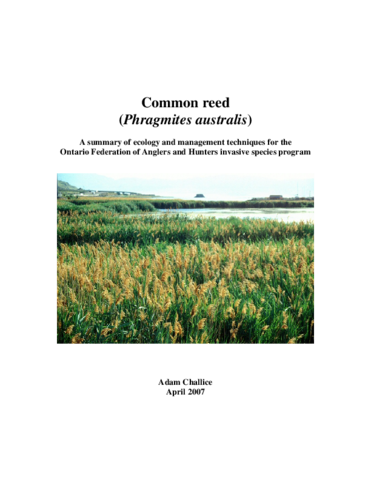Trent Community Research Centre Project Collection
Displaying 1 - 6 of 6
Invasive species study: the biology, distribution and control of the dog-strangling vine (Vincetoxicum Rossicum), in Southern Ontario
Year: 2008, 2008
Member of: Trent Community Research Centre Project Collection
Name(s): Creator (cre): Aitken, Rob, Other (oth): Trent University Biology Dept, Supporting host (sht): Ontario Federation of Anglers & Hunters, Issuing body (isb): Trent Centre for Community-Based Education
Abstract: <p>Dog-strangling vine (Vincetoxicum rossicum), also known as pale-swallow-wort, was introduced to North America in the late 1800s. Since its introduction it has spread through the great lakes basin in southern Ontario and the north eastern United States. If the invasion of dog-strangling vine is to be controlled an organized long term management plan involving conservation organizations… more
Full Text: The Biology, Distribution and Control of the Dog-strangling vine (Vincetoxicum rossicum) in Southern Ontario Name: Rob Aitken Student Number: 0279450 Course: BIOL 398H – Community Based Research Project Date: March 18, 2008 ABSTRACT Dog-strangling vine …
Horticultural pathways: policies and legislation regarding horticultural invasive species
Year: 2008, 2008
Member of: Trent Community Research Centre Project Collection
Name(s): Creator (cre): Reid, Keith, Creator (cre): Noronha, Jason, Creator (cre): Hilts, Natasha, Supporting host (sht): Ontario Federation of Anglers & Hunters, Other (oth): Trent University Environmental Resource Studies, Issuing body (isb): Trent Centre for Community-Based Education
Abstract: <p>Invasive plants are plant species that are not native to Canada and United States. These plants are a problem because they out compete and displace native plants that wildlife depend on. This report outlines some goals for prevention and management of invasive species.</p>
Full Text: Horticultural Pathways: Policies and Legislation Regarding Horticultural Invasive Species Includes: Final Report By Keith Reid, Jason Noronha and Natasha Hilts Completed for: OFAH Supervising Professor: Prof. Tom Whillans, Trent University Trent Centre …
A synthesis of the current literature on the distribution, life history, and impacts associated with invasive rainbow smelt (osmerus mordax)
Year: 2007, 2007
Member of: Trent Community Research Centre Project Collection
Name(s): Creator (cre): Chard, Andrew, Other (oth): Trent University Environmental Resource Studies, Supporting host (sht): Ontario Federation of Anglers & Hunters, Issuing body (isb): Trent Centre for Community-Based Education
Abstract: <p>This report represents a synthesis of the current relevant literature on the life history characteristics and impacts associated with invasive rainbow smelt (Osmerus mordax) in Ontario.</p>
Full Text: Invasive Species – Rainbow Smelt Includes: Final Report By Andrew Chard Completed for: OFAH Supervising Professor: Prof. Tom Whillans, Trent University Trent Centre for Community-Based Education Department: Environmental and Resource Studies Course Code: …
Invasion of the round goby (negobius melanostomus) in Great Lake tributaries
Year: 2007, 2007
Member of: Trent Community Research Centre Project Collection
Name(s): Creator (cre): Waite, Bethany, Other (oth): Trent University Environmental Resource Science, Supporting host (sht): Ontario Federation of Anglers & Hunters, Issuing body (isb): Trent Centre for Community-Based Education
Abstract: <p>Invasive species are a continuing issue for Ontario, in both terrestrial and aquatic environments. The round goby is an example of this. This study focuses on the distribution of round gobies within Great Lake tributaries and the impact of barriers.</p>
Full Text: Submitted by: Bethany Waite Student number: 0217051 Course Code: ERSC 384H Faculty Supervisor: Michael Fox Host Supervisor: David Copplestone Date: April 4, 2008 Invasion of the Round Goby (Neogobius melanostomus) in Great Lake Tributaries Project ID: 856 …
Common reed (phragmites australis): a summary of ecology and management techniques for the Ontario Federation of Anglers and Hunters invasive species program
Year: 2007, 2007
Member of: Trent Community Research Centre Project Collection
Name(s): Creator (cre): Challice, Adam, Other (oth): Trent University Environmental Resource Science, Supporting host (sht): Ontario Federation of Anglers & Hunters, Issuing body (isb): Trent Centre for Community-Based Education
Full Text: Common reed (Phragmites australis) A summary of ecology and management techniques for the Ontario Federation of Anglers and Hunters invasive species program Adam Challice April 2007 Table of Contents Introduction Physical Characteristics of Phragmites …
Eurasian watermilfoil: profile, control and predicting dispersal patterns of an invasive species in Kawartha Lakes Region
Year: 2007, 2007
Member of: Trent Community Research Centre Project Collection
Name(s): Creator (cre): Khan, Tasnova, Supporting host (sht): Ontario Federation of Anglers & Hunters, Other (oth): Trent University Environmental Resource Science, Issuing body (isb): Trent Centre for Community-Based Education
Abstract: <p>The OFAH has classified the Eurasian watermilfoil, Myriophyllum spicatum, as an aquatic emergent species that requires close attention. The author conducted a comprehensive literature search to gather and synthesize a comprehensive report on Eurasian watermilfoil, discussing the characteristics, control methods, and methods for predicting dispersal patterns.</p>
Full Text: Eurasian Watermilfoil: Profile, control and predicting dispersal patterns of an invasive species in Kawartha Lakes region Abstract: The OFAH has classified the Eurasian watermilfoil, Myriophyllum spicatum, as an aquatic emergent species that requires …





